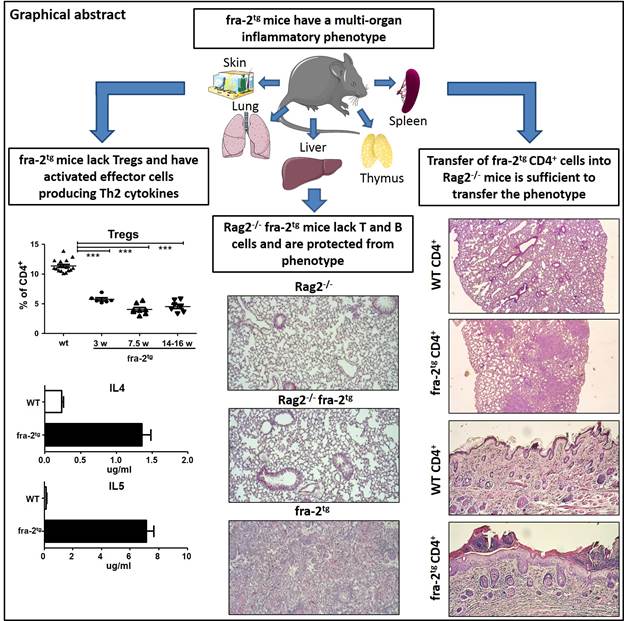Session Information
Session Type: ACR Poster Session C
Session Time: 9:00AM-11:00AM
Background/Purpose: Fos-related antigen 2 (Fra-2) is a transcription factor belonging to the Fos family proteins which is part of the AP-1 transcription factor complex. We recently described a fra-2 transgenic (tg) mouse model which develops a multi-organ inflammatory phenotype. We have observed abnormalities in the T cell compartment, which led us to hypothesize that fra-2tg mice develop a T cell-driven autoimmune phenotype.
Here we aimed to assess the autoimmune nature of the phenotype in fra-2tg mice and to characterize the potential role of Treg cells.
Methods: We used previously generated fra-2tg overexpressing mice. T lymphocyte populations were analyzed by flow cytometry for expression of activation markers (CD62L, CD44 and CD25) and secretion of cytokines. We transferred purified CD4+ T cells into Rag2-/- mice lacking T and B cells, and we generated Rag2-/-fra-2tg mice. We used IL-2-IL-2 antibody complexes (JES6.1A12 clone) to induce the proliferation of CD25+ cells in vivo.
Results: Rag2-/-fra-2tg did not develop inflammatory manifestations (n=10), demonstrating that the phenotype in fra-2tg mice is autoimmune and requires the presence of T and/or B cells to develop. Accordingly, we tested the ability of CD4+ T cells to induce the phenotype. We found that the transfer of 1*106 purified CD4+ cells from 16 week-old fra-2tg mice into Rag2-/- recipients was sufficient to induce the phenotype (n=3).
Analysis of T cell populations from fra-2tg mice confirmed the presence of activated CD4+ and CD8+ cells in spleen and lung (n=6). After in vitro stimulation, CD4+ T cells from fra-2tg mice had increased Th2 cytokines production (IL-4, IL-5 and IL-13) and we observed an increase in IgE levels in the serum of fra-2tg mice. Thus, these data strongly suggest a Th2 T cell-driven autoimmune disease in these mice.
We also observed a striking decrease of Treg cells in fra-2tg mice, which might explain the observed autoimmune phenotype. Supporting this hypothesis, we found that 3 week-old mice, which were devoid of organ manifestations and of T cell activation, showed already the same defect in the Treg cell population as older mice (n=6, p<0.001).
Interestingly, we also found that in vivo stimulation with IL-2-IL-2 antibody complexes failed to induce the proliferation of Treg cells in fra-2tg mice compared to WT mice, suggesting that fra-2 overexpression affects IL-2 dependent proliferation of fra-2tg Tregs. These data indicate that Fra-2 affects Treg homeostasis by modulating IL-2 responsiveness, resulting in the development of an autoimmune phenotype.
Conclusion: Our data suggest that Fra-2 controls Treg cell development or homeostasis, possibly by modulating IL-2 signaling in T cells, which leads to autoimmunity in this mouse model. This new pathway could be targeted in a translational approach to modulate the capacity of T cells to differentiate in Tregs during autoimmune disease.
To cite this abstract in AMA style:
Renoux F, Stellato M, Impellizzieri D, Vogetseder A, Blyszczuk P, Huang R, Subramaniam A, Dees C, Distler J, Kania G, Boyman O, Distler O. Fra-2 Overexpression Leads to Systemic Autoimmunity By Affecting IL2 Dependent Treg Homeostasis [abstract]. Arthritis Rheumatol. 2017; 69 (suppl 10). https://acrabstracts.org/abstract/fra-2-overexpression-leads-to-systemic-autoimmunity-by-affecting-il2-dependent-treg-homeostasis/. Accessed .« Back to 2017 ACR/ARHP Annual Meeting
ACR Meeting Abstracts - https://acrabstracts.org/abstract/fra-2-overexpression-leads-to-systemic-autoimmunity-by-affecting-il2-dependent-treg-homeostasis/

